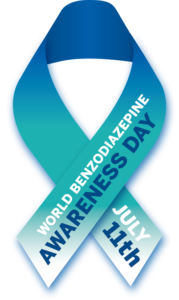On this page you can learn about what World Benzodiazepine Awareness Day (W-BAD) is about.
What does W-BAD stand for?
What is W-BAD’s official motto?
“Change Through Unity”
What are our official logos?

The W-BAD official logo, highlighting a global effort.

W-BAD’s “Change Through Unity” logo

The W-BAD awareness ribbon, shaded with the colors of “waves” which represent the up and down nature of recovery.

W-BAD’s QR code
What is W-BAD’s mission statement?
World Benzodiazepine Awareness Day seeks to raise global awareness around the problem of iatrogenic (medical-induced) benzodiazepine physical dependence that continues to affect an enormous amount of unsuspecting, innocent people worldwide—either directly or indirectly. See full mission statement
What are W-BAD’s Aims and Objectives?
To see W-BAD’s vision, purpose, mission, goals and objectives, please visit the W-BAD Aims Page.
What does W-BAD want?
In a nutshell…
- Patients to receive informed consent (be it via a black box warning or a signed form prior to prescription) about the risks and dangers of taking benzodiazepines (dependence, tolerance, withdrawal, adverse effects) before starting the drugs as well as the risks and dangers of combining benzodiazepines with certain other drugs.
- New patients to be given short-term prescriptions only (unless there is a proven medical need/exception, which should be the rare minority), which are limited to 2-4 weeks (4 weeks should include the tapering off time), as well as informed consent prior to prescription (including that even short-term use does not negate all risks).
- Existing physically dependent patients to not be forced to come off the drugs abruptly against their will or at a taper rate that is faster than their body can tolerate.
- Support made available in the form of slow, patient-controlled tapering for already-dependent patients who do wish to taper off.
- Medical students and other prescribers to be required to be better-educated about recommended benzodiazepine prescribing practices, tapering practices, and the signs and symptoms of benzodiazepine tolerance/toxicity/interdose withdrawal/physical dependence/withdrawal/protracted withdrawal syndrome.
The following video (2:43) briefly details the wants and needs, or what W-BAD is campaigning for, in regards to the changes that are so badly needed to remedy the iatrogenic benzodiazepine problem that has been allowed to persist for decades:
Click on CC for captions in English. To contribute translations of this video in another language, click here.
We do not call for a “banning of benzodiazepines”. Such a banning of benzodiazepines would be unrealistic; there is nothing to replace them and they can be valuable for certain conditions in the short-term (e.g., seizure in a hospital setting, one-time use for flying or dental procedures, etc.). Not only that, calling for a “banning” would endanger those already iatrogenically-dependent patients who should be, in a ban situation, forced off of the drugs against their wishes—or faster than they can manage to come off in a patient-directed taper. We do, however, urge all medical providers and prescribers to get educated about the drugs and to listen to what their patients are saying.
- We want everyone to know how serious this is.
- We want it to stop happening.
- We want validation of our suffering.
- We want a name for this condition/syndrome.
- We want to no longer be victim-blamed or gaslighted for this very real condition.
- We don’t want to feel alone, disbelieved or abandoned any longer.
- We want people to be able to make informed decisions about their health and medications.
- We want to effect change.
- We are asking for research into this condition.
- We want better treatment options
- We want people to be offered safer alternatives before being medicated.
- We want answers.
- We hope for a cure.
- guidelines, which exist for a reason.
- We want accountability.
- We want no new long-term dependent patients.
- We want proper assistance and support for already-dependent patients.
- We want better regulations and warnings on these drugs.
- We want smaller-dose drugs available to assist in tapering ease.
- We want the damage that was done to us to be repaired/reversed.
- We want this problem to change before another sixty years passes and we’re still in the same place.
- We’d like an apology from the medical community for what has happened, and for allowing it to persist for so long.
- We don’t want anyone else to get sick.
- We don’t want anyone else to die.

